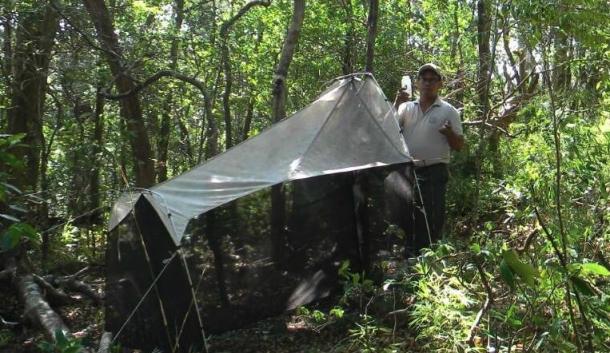
Parataxonomist Guillermo "Memo" Pereira holds insects to be barcoded as he changes a malaise trap. Photo by Dan Janzen.
Tens of thousands of previously unrecorded species will be discovered, says Dr. Paul Hebert, the director of the Centre for Biodiversity Genomics at the University of Guelph, Canada, thanks to a new $1 million, three-year grant from the Walder Foundation to the Centre. That donation, along with a generous donation from a Canadian individual and from the Hastings Family Foundation, will enable the Centre’s DNA barcoding effort to continue. “The Walder Foundation is proud to support the important work of cataloging the incredible diversity of one of the most biodiverse places on Earth,” said Elizabeth Walder, the president and executive director of the foundation. “By using DNA barcoding to better understand species diversity in these precious places, we hope that diversity can be better protected while sustaining the livelihoods of those that depend on it.” According to an article in the University of Guelph News, project researchers have analyzed some two million species from Área de Conservación Guanacaste (ACG), including 50,000 insect species, at least half of which are new to science. “We’ve done a deep dive into the ACG,” said Hebert. “This new round of funding will allow us to probe insect diversity in all of Costa Rica’s eco-regions.” The project is part of the GDFCF/ACG BioAlfa initiative, which aims to barcode every species in Costa Rica. “Our work is developing an approach that will advance understanding of the scale and causes of biodiversity shifts globally,” said Hebert. The full article, by Hannah James, can be viewed here.